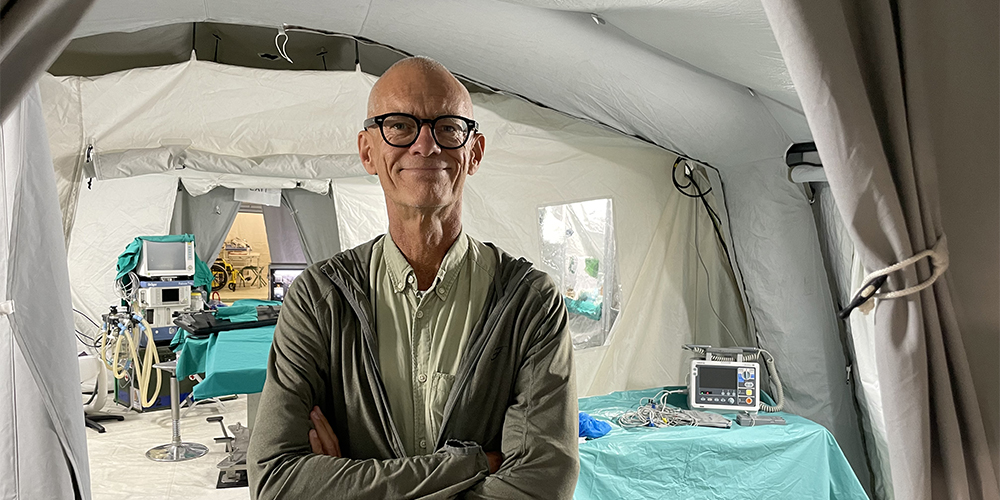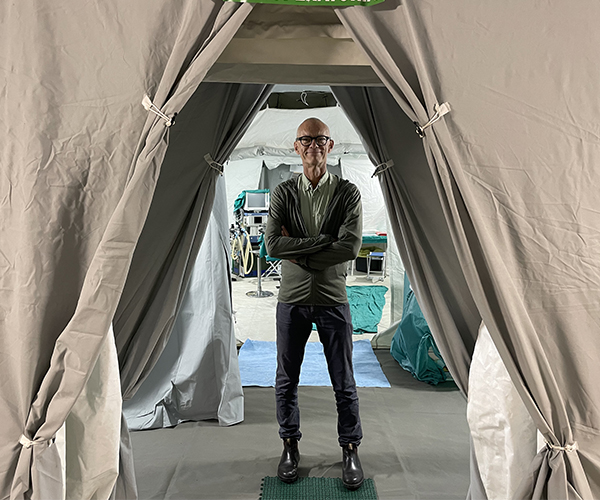Expert in disaster medicine is awarded KTH Great Prize 2024

He is a disaster doctor and coordinator who is often part of the first aid teams on the ground in crisis and war zones. He has initiated the Swedish section of Médecins Sans Frontières and is driven by compassion. Johan von Schreeb receives KTH Great Prize for his efforts to reduce suffering in the world.
Johan von Schreeb is currently in Tuscany for the WHO classification of an Italian field hospital. In a few days, he will move on to Beirut to contribute to international relief efforts.
This work is part of the Emergency medical teams programme that he has helped to set up.
“We want to create a pool of field hospitals around the world, which meet quality standards and can be coordinated for emergency and effective care.”
Von Schreeb points out that relief efforts are too often focused on sending supplies such as unsorted medicines, tents and clothes, while the biggest shortage is in experienced staff and coordination.
“In Sweden, too, a national field hospital is being developed in accordance to WHO standards, and we look forward to contributing to it.”
In his professional life, he mixes research with fieldwork and policy. Back home in Sweden, he teaches courses as a professor of global disaster medicine, to build the capacity of the new generation of relief workers.
In 1993, he was one of the initiators behind the Swedish section of Médecins Sans Frontières.
“By organising ourselves, we created an opportunity to be on the ground quickly in disasters, as an independent, impartial and neutral organisation. It has been incredible to help build the Swedish section. In 2023, over one billion Swedish kronor was raised in Sweden alone!

Von Schreeb received his PhD from Karolinska Institutet in 2007, as Professor Hans Rosling 's last PhD student.
“Hans Rosling has left his mark on my specialisation in disaster medicine. His thesis was that you need to be out in the field, to expose yourself, to really see what works and build trust between aid workers and the population. I ‘have him on my shoulder’ all the time and I hear him shouting in my ear, ‘Johan, you have to think!’”
What is your greatest driving force?
“To be present in disaster areas in different ways. Listening to the patients, the women and the victims. It's our duty to speak on their behalf and ensure that aid is provided on their terms.
- The consequences of evil are hard to live with, but we know what happens when we leave countries in the lurch, like in Sudan right now. When a war-torn country is left without anyone from outside witnessing what is happening and being able to get the outside world to act, then we know that things are going badly. Ignorance kills.”
“We should remember that the majority of people on earth want a peaceful life. Waving their children off to school and having dinner together in the evening. A few per cent want something different. It is our duty to help and not let the bad guys take over.”
“It is hard when people continue to die for a long time in a meaningless way, like in Ukraine, but the important thing for me is to keep going, to find ways to make a difference for the vulnerable.”
How do you keep hope for the future despite the fact that you constantly face the effects of crises and wars in your professional life?
“I like to think that the only person I take orders from is the old woman in the village who cooks and distributes rice porridge to affected people in the neighbourhood. It is her gaze that gives me strength. It is that kind of generous and non-privileged people that inspire me. In my head, they are the ones I communicate with to find out what is needed in different situations.”
“It's easy to describe people as evil, but what's important is to recognise that there are plenty of people who want to do good and who are willing to help.”
Text: Katarina Ahlfort
Photo: Jorge Durand
